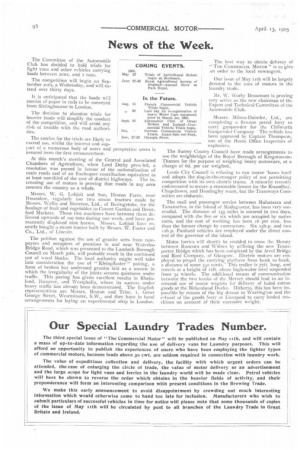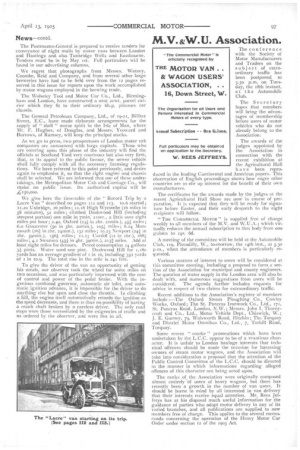News of the Week.
Page 4

Page 5

If you've noticed an error in this article please click here to report it so we can fix it.
The Committee of the Automobile Club has decided to hold trials for light vans and other vehicles carrying loads between 2ewt. and 2 tons.
The competition will begin on September 20th, a Wednesday, and will extend over thirty days.
It is anticipated that the loads wi:1 consist of paper in rolls to be conveyed from Sittingbourne to London.
The decision to abandon trials for heavier loads will simplify the conduct of the competition, and will avoid any risk of trouble with the road authorities.
The entries for the trials are likely to exceed mo, whilst the interest and support of a numerous body of users and assured from the first announceMent.
At this month's meeting of the Central and Associated Chambers of Agriculture, when Lord Derby presded, a resolution was passed in favour of the nationalisation of main roads and of an Exchequer contribution equivalent to at least one-third of the cost of district highways. The increasing use of motors is proving that roads in any area concern the country as a whole.
Messrs. W. G. Lobjoit and Son, Heston Farm, near Hounslow, regularly use two steam tractors made by Messrs. Wallis and Steevens, Ltd., of Basingstoke, for the haulage of fruit and vegetables to Covent Garden and Brentford Markets. These two machines have between them delivered upwards of moo tons during one week, and have permanently displaced nine horses. Messrs. Lobjoit have recently bought a steam tractor built by Messrs. W. Foster and Co., Ltd., of Lincoln.
The petition against the use of granite setts from ratepayers and occupiers of premises in and near Waterioo Bridge Road, which was presented to the Lambeth Borough Council on March 3oth, will probably result in the continued use of wood blocks. The local authority might well take into consideration the use of " Kleinpflaster " paving, a form of broken but undressed granite laid as a mosaic in which the irregularity of the joints secures quietness under traffic. This paving has given excellent results in Rheinland, Hanover, and Westphalia, where its success under heavy traffic has already been demonstrated. The English representatives are Messrs. Bruton and Trier, 7, Great George Street, Westminster, S.W., and they have in hand arrangements for laying an experimental strip in London. The best way to obtain delivery of " THE COMMERCIAL MOTOR" is to give an order to the local newsagent.
Our issue of May i ith will be largely devoted to the uses of motors in the laundry trade.
Mr. W. Worby Beaumont is proving very active as the new chairman of the Expert and Technical Committee of the Automobile Club.
Messrs. Milnes-Daimler, Ltd., are completing a five-ton petrol lorry to carry gunpowder for the Chilworth Gunpowder Company. The vehicle has been approved by Captain Thompson, one of the Home Office Inspectors of explosives.
The Surrey County Council have made arrangements to use the weighbridge of the Royal Borough of Kingston-onThames for the purpose of weighing heavy motorcars, at a charge of 6d. per car weighed., Leeds City Council is refusing to run motor 'buses itself and adopts the dog-in-the-manger policy of not permitting competition with its own electric trams. A minority recently endeavoured to secure a reasonable license for the Roundhay, Chapeltown, and Headingley route, but the Tramways Committee are obdurate.
The mail and passenger service between Mahatsara and Tananarivo, in the Island of Madagascar, has been very successful. The distance of 755 miles is covered in two days, compared with the five or six which are occupied by native carts, and the cost of working has been 76 per cent. less than the former charge by contractors. Six 75h.p. and two 12h.p. Panhard vehicles are employed under the direct control of the governor of the island.
Motor lorries will shortly be enabled to cross the Mersey between Runcorn and Widnes by utilising the new Transporter Bridge which has been completed by the Arrol Bridge and Roof Company, of Glasgow. Electric motors are employed to propel the carrying platform from bank to bank. a distance of some 330 yards. This trolley is 77ft. long, and travels at a height of 72ft. above high-water level suspended from 32 wheels. The additional means of communication between the two banks of the Mersey should lead to an increased use of motor wagons for delivery of baled cotton goods at the Birkenhead Docks. Hitherto, this has been hitpossible by reason of the big detour to Warrington and the refusal of the goods ferry at Liverpool to carry loaded machines on account of their excessive weight. The Postmaster-General is prepared to receive tenders for conveyance of night mails by motor vans between London and Hastings and. also Tunbridge Vells and Eastbourne. Tenders must be in by May 1st. Full particulars will be found in our advertising columns.
We regret that photographs from Messrs. Watney, Coombe, Reid and. Company, and from several other large breweries have had to be held over from the / 2 pages reserved ia this issue for reports upon the work accomplished by motor wagons employed in the brewing trade.
The Wolseley Tool and Motor Car Co., Ltd., Birmingham and London, have constructed a neat 2cw1. parcel carrier which they fit to their ordinary 6h.p. pleasure car chassis.
The General Petroleum Company, Ltd., of 19-21, Billiter Street, E.G., have made elaborate arrangements for the supply of " shell " motor spirit in the Isle of Man, where Mr. F. Hughes, of Douglas, and Messrs: Yeoward and Burrows, of Ramsey, will keep the principal stocks.
As we go to press, two prospectuses of London motor cab companies are announced with large capitals. Those who are entering upon this phase of the industry will find the officials at Scotland Yard very courteous but also very firm, that, in its appeal to the public favour, the newer vehicle shall fully comply with all the necessary licensing regulations. We have referred to this point previously, and desire again to emphasise it, so that the right engine and chassis shall be selected. We are informed that one of these undertakings, the Metropolitan Motor Cab and Carriage Co., will make no public issue. Its authorised capital will be Zi5o,000.
We give here the time-table of the " Record Trip by a Lacre Van "described on pages 112 and i13. io.6 started; 11.20 Uxbridge, 16 miles; 12.18 High Wycombe (t6 miles in s8 minutes), 32 miles; climbed Dashwood Hill (including steepest portion) one mile in 7rnin'. 2/sec., a little over eight miles per hour ; 2.40, Oxford (231 in 2hr. 22min.), 551 miles; 6.o Gloucester (5o in 3hr. 2omm.), to5L miles; 8.24 Monmouth (2(m1 in 2hr, 24min.), 132 miles; 10.23 Newport (24-1. in 'hr. 59min.), ishi miles; 11.23 Cardiff (12 in ihr.), i6fq miles; 4.2 Swansea (45* in 4hr. 39min.), 213 miles. Md at least eight miles for detours. Petrol consumption 14 gallons 31 pints. Water used one pint. Dashwood Hill for i,i8o yards has an average gradient of I in i, including 352 yards of / in 10.9. The total rise in the mile is 241 feet.
To give the driver of the, van an opportunity of getting his meals, our observer took the wheel for some miles on two occasions, and was particularly impressed with the ease of control and power of the pedal brake. With the ingenious combined governor, automatic air inlet, and automa& ignition advance, it is impossible for the driver to do anything else but open and close the throttle. In climbing a hill, the engine itself automatically retards the ignition as the speed decreases, and there is thus no possibility of having a crank shaft broken by a careless driver. The only road stops were those necessitated by the exigencies of traffic and as ordered by the observer, and were five in all.
























